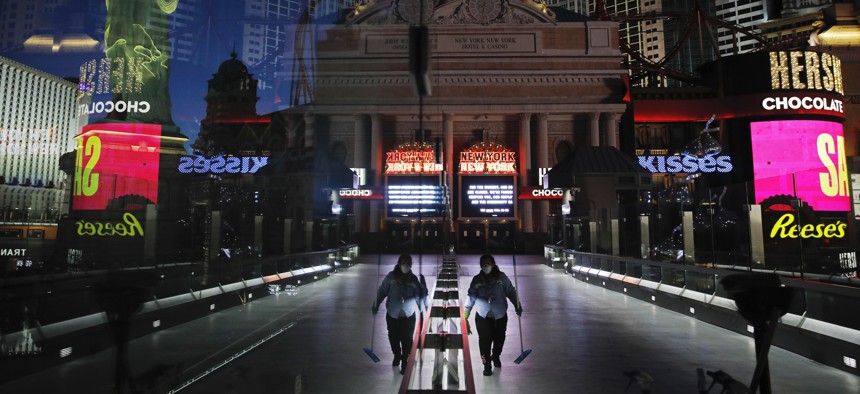Tourism, Business Travel May Not Fully Recover for 4 Years, Industry Officials Say

In this April 18, 2020, file photo, a lone worker wearing a mask cleans a pedestrian walkway devoid of the usual crowds as casinos and other business are shuttered due to the coronavirus outbreak in Las Vegas. AP Photo/John Locher
Corporate travel spending dropped 70% during the pandemic, contributing to the tax revenue losses that tourism-dependent cities and states experienced.
It could take up to four years before business events and travel fully recover from the coronavirus pandemic, tourism experts told a Senate committee this week.
Spending on business travel plummeted 70% in 2020 as a result of the coronavirus pandemic, cutting into the tax revenues of many tourism-dependent states, said Tori Emerson Barnes, the executive vice president of public affairs and policy at the U.S. Travel Association. But even as more than 72 million Americans are fully vaccinated and people begin to travel again, the travel and tourism industry faces significant barriers to rebound, experts told a new Senate subcommittee on tourism during its inaugural hearing Tuesday.
“Professional meetings and events, which are the travel industry’s largest generator of spending revenue, are still restricted in many states,” Emerson Barnes told the Senate Subcommittee on Tourism, Trade and Export Promotion.
Travel industry experts are asking lawmakers and the federal government for help jump starting conventions and other business-related events. Specifically, the U.S. Travel Association has asked the Centers for Disease Control and Prevention to approve guidance that states and localities could use to lift restrictions and help restart professional meetings and events, Emerson Barnes said.
“Nearly all sectors of the economy have clear guidelines to allow them to reopen amid the pandemic,” she said. “Business meetings are different from other mass gatherings due to the level of control that can be implemented and should not remain closed while the rest of the economy is given the green light to reopen.”
Overall tax revenues declined in 28 states last year, with the steepest drops reported in states that rely heavily on tourism.
“People in this industry need their jobs back,” said Steve Hill,CEO and president of the Las Vegas Convention and Visitors Authority. “Our state and local governments need this industry to recover to generate tax revenue they count on to provide services.”
In a typical year, Las Vegas collects about $300 million in room tax revenues from hotel bookings, Hill said. In the fiscal year that ends in June, Hill said the city expects to collect about $100 million, or a third of its normal revenue. The following fiscal year, the city is projected to collect about 70% of its typical room tax revenue.
“We need to get to the point where social distancing is no longer necessary,” Hill said. “Like many destinations, Las Vegas doesn’t work well without a crowd.”
Earlier this month, the CDC said people who have been fully vaccinated against covid can safely travel within the U.S. but still need to wear a mask and social distance.
Sen. Jacky Rosen, the chairwoman of the subcommittee, said the outsize impact of the pandemic on Nevada’s economy underscored the work that still has yet to be done to get the tourism industry back on track.
“Conventions and business travel is a lifeblood, not just Las Vegas but so many other cities across the country,” said Rosen, a Nevada Democrat.
Another problem plaguing the tourism and travel industry is a workforce shortage.Tourism was Florida’s largest industry before the pandemic, employing more than 1.5 million workers. But 65% of the state’s tourism employees were laid off or furloughed during the pandemic and many have little incentive to come back while still eligible for unemployment benefits, said Carol Dover, president and CEO of the Florida Restaurant and Lodging Association.
“Although we are allowed to operate at 100% capacity in Florida, we can’t find staff,” Dover said. “Simply put, we are competing with state and federal unemployment benefits.”
The federal government and many states suspended unemployment insurance eligibility rules that required unemployed people to continue looking for work in order to keep collecting jobless benefits. Dover said resuming that mandate would likely help push people back into the workforce.
Andrea Noble is a staff correspondent with Route Fifty.
NEXT STORY: California builds data warehouse to better manage homelessness





